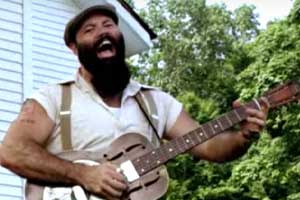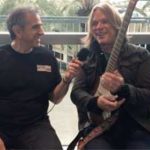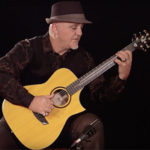The good Reverend lights a Front Porch fire on his latest album
By Gary Graff
March 10, 2017
The Reverend Peyton’s Big Damn Band blew out of southern Indiana like something out of the past, both aurally — from its resonator guitars and washboards — and visually, like the house band for O Brother, Where Art Thou? Led by the good “Reverend” Josh Peyton and his facility for anything with strings, the group — which also includes his wife, Breezy Peyton, and Max Senteney — mines the deepest roots of American music, especially from the Mississippi Delta where the trio traveled to study with the likes of David “Honeyboy” Edwards, T-Model Ford and Robert Belfour.
It’s paid off in a catalog of fiery but also diverse albums — right up to the new Front Porch Sessions, the follow-up to 2015’s well-received So Delicious and an intimate album that focuses on Peyton to such an extent that it’s nearly a solo album, with subtle but appropriate contributions from the rest of the Big Damn Band. We caught up with the Reverend as he was tooling down the highway towards Louisville to pick up a few things the group needed for its upcoming tour, and he was of course happy to pull over and have a little “Front Porch” chat…
FGPO: First things first; there’s a viral video of you out there now playing a shotgun guitar — and then firing it off. Explain.
Peyton: [laughs] That’s something my buddy, Brian Fleming, built for me; he built me a three-string cigar box guitar I play on this new album, too. I just had this idea and said: “Can you do this?” And he said yes, and there is. And it’s funny; I have all these intricate country blues songs, I’ve composed and arranged all these records and produced a bunch of things, and the most viral video I’ve got is me shooting this damn shotgun guitar.
FGPO: You do have pretty special, and specialized tastes in your musical instruments, don’t you?
Peyton: Oh, man, you know it. First off, I love old resonator guitars. My old resonators are all on this record. I’ve got a 1929 Gibson L2 that I’ve had for a long time, the flat top I used. But my secret weapon on this record is a 1954 Supro; that’s become my secret weapon in the studio. When I’m asked to play on someone’s record and that kind of thing, I’ve been bringing my Supro. It’s such a pawn shop kind of guitar. There’s a lot of people that pick it up and go: “This is horrible! Why are you playing this?!” But, man, I love the vibe of it. I’ve got this old Supro amp I plug it into and it sounds like coming back from time. It just sounds old.
FGPO: What’s the story with the cigar box guitar you mentioned?
Peyton: Oh, that’s so cool. It’s a three-string cigar box guitar I play on the song “Shakey Shirley.” Brian built it. It’s made from a spoke from the commissary where Charlie Patton grew up on Dockery Farm. He built the pickup from scratch. It’s a magical beast, and it sounds huge. You listen to “Shakey Shirley” and no way do you think that’s a three-string cigar box guitar.
FGPO: So if we handed you a conventional guitar, could you handle that?
Peyton: Oh yeah, man. You might not know it, but the song “Flying Squirrels” on the record, that’s on Telecaster, a kind of homemade Tele, carved out of wood and everything. So, yeah, I can handle it.
FGPO: But the weirder, or more unconventional, the better, right?
Peyton: Y’know, over the years I’ve changed how I approach a lot of things. I used to be really obtuse about guitars; “I’m gonna play this ’cause this is what you do or what my hero played.” But I picked up this 12-string Danelectro about 10 years ago at a guy’s house that we stayed at on tour. I played that thing just for fun, and I said to myself: “Y’know what this sounds like? This sounds like ME,” and I realized it really doesn’t matter what instrument I play, I have such a style that I can’t undo it, no matter what [instrument] I pick up. I go and play on someone else’s record and it’s hard not to sound like myself. I play a lot of guitars because I like their sound or their look. If I only had a Telecaster I could do the whole show that way. I’ve really learned it’s not the guitar, it’s the player; I have to remind myself of that sometimes when I have something break on me. [laughs.]
FGPO: The Front Porch Sessions is very much about the Rev. Peyton’s playing. What’s the story here?
Peyton: Oh, man, I’m so proud of this album. I wasn’t sure how people were going to take it. It’s a very stripped-down record, but I think it’s the most beautiful record we’ve done, at least sonically. The whole idea was to take these songs and go in the studio and record them as stripped-down as possible. The only things we’d add would be what’s necessary, not just go in to add things just to add them. We started every song with me and a guitar and went from there. At first I thought maybe we’d end up with an EP, then when all was said and done we had a record. It was stripped down, but we had a record.
FGPO: That approach really put the onus on you as a player and singer, didn’t it?
Peyton: You’re laid bare on a record like this. You’re out there in front. I’m used to standing up there, fronting a band, but it’s a lot different when it’s you and a guitar. But sonically the thing I like about it is it’s just old guitars and old microphones and real, hand-made music. This is written and performed and produced by me, and if someone doesn’t like it they probably don’t like me, and that’s kind of hard to take [laughs], but it is what it is. I think the older I get the more I’m like: “Look, at this point this is how I am,” and I think I’m getting better. I think this is literally the best guitar picking I’ve ever done, and that makes me happy. If my picking’s gonna be this good, it might as well be on a record where everybody can hear it.
FGPO: As you noted before, there was a little apprehension about that.
Peyton: I was going: “Man, I like this thing how it is,” but I didn’t know what other people would think. So I started sending it to people: “What do you think of this?” And people liked it. They were like: “Leave it just like it is. This is neat.” So I decided that was the way we’re gonna do it.”
FGPO: Do you feel like it was a reaction, in a way, after going for a bigger sound on So Delicious?
Peyton: It was really…I don’t want to say a whim, ’cause that makes it sound like it wasn’t thought out very well. I just had this itch to record. I just wanted to get in and make another record. I needed to get in the studio. I didn’t have a firm grasp on how things were going to be, but I had these songs and said: “We’ll start with just me and a guitar and we’ll build ’em up from there.”
FGPO: What was it about these songs that gave you that itch?
Peyton: There’s an interesting mix of stuff on this record, more than I’ve done in the past. I just had some songs I wanted to try that I’ve been kind of messing with that I thought I could do some justice to. And with the songs that aren’t mine, I felt like I could do my own thing with ’em. It just felt like a group of songs I could really sing myself into and do something good with.
FGPO: Talk about the covers you chose?
Peyton: It was nice especially to do some Furry Lewis. I don’t think Furry Lewis gets the credit he deserves in the history of recorded music. He was a big influence on me. “When My Baby Left Me” is a Furry Lewis song, and the song “When You Lose Your Money” is basically a version of the old classic “Stagga Lee,” which is such a standard that no one really wrote it, but the version I do I learned from Furry Lewis. So if nothing else, I hope people get some sort of insight into Furry Lewis and want to hear more of his music.
FGPO: How are these very intimate recordings translating on stage, where the Big Damn Band tends to get a little…shall we say rowdy?
Peyton: [laughs] Well, what we’re doing is setting up two drum kits at a lot of the shows — a regular drum set and the suitcase drum set we used on the album. And some nights are even more stripped-down than others. Every show we do at least one or two songs that are just me and then build up from there depending on how I feel night to night. I put a lot of time and effort into the setlist, and some people might say I’m crazy — “What the hell, just play the songs!” But these songs are personal, so I have to be able to feel the song on a given night. I don’t like faking it. Sometimes a song is too emotional or not emotional enough for me on a given day. That might sound crazy, but it’s true. I think it’s part of our genre, too; If you’re just doing pop-dance songs, it doesn’t really matter, but with these songs it does, and you have to be mindful of that or it doesn’t work.






